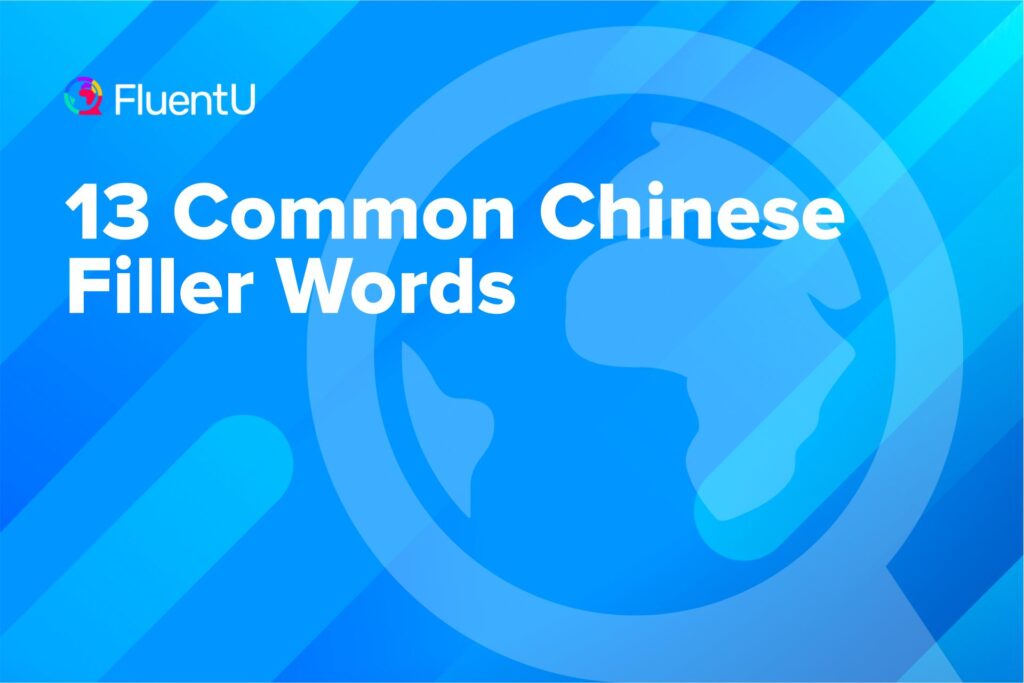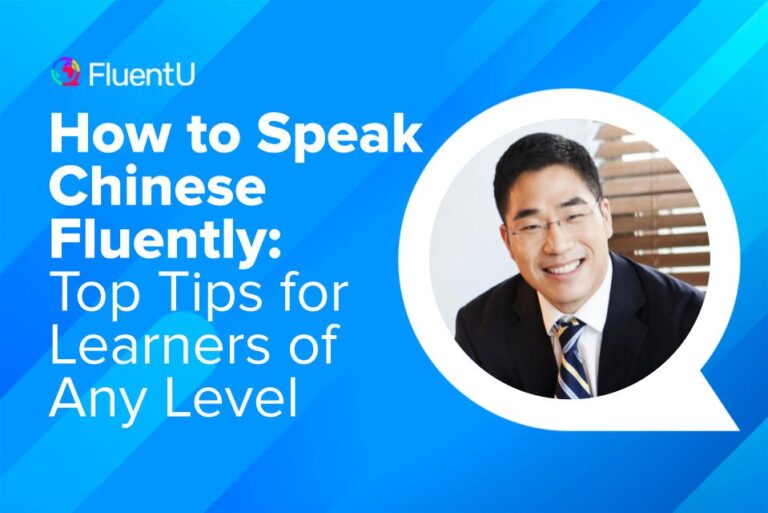13 Common Chinese Filler Words

Just like “um” and “uh” in English, Chinese also has its own filler words.
Learn the Chinese filler words below properly, and you’ll sound much more natural in Chinese, especially since native speakers say them a lot.
You won’t find them in textbooks, but filler words like 那个 (nàge) and 就是 (jiùshì) are a constant part of realistic, everyday conversations.
Download: This blog post is available as a convenient and portable PDF that you can take anywhere. Click here to get a copy. (Download)
那个 (nàge)
那个 literally means “that,” but it can also be used as a placeholder.
Be very careful when you use this word, as it can be misheard as the n-word in English!
In colloquial usage, 那个 in Mandarin Chinese is often used as a filler word or placeholder when a speaker is pausing or hesitating, similar to saying “uh” or “um” in English. It doesn’t carry any specific meaning in this context; rather, it serves to fill the silence while the speaker gathers their thoughts.
他问我关于那个……那个……那个计划。
(Tā wèn wǒ guānyú nàge… nàge… nàge jìhuà.)
He asked me about that… um… that plan.
One famous example of 那个 (nà ge) being used in a Chinese song is in the song 北京欢迎你 (běi jīng huān yíng nǐ), “Beijing Welcomes You.” In this song, 那个 is used as a filler word in the chorus:
那个,有一种力量,那个,来自每个角落,那个,照亮我心中的那个地方。
(Nàge, yǒu yì zhǒng lìliàng, nàge, lái zì měi ge jiǎoluò, nàge, zhàoliàng wǒ xīnzhōng de nàge dì fang.)
That, there is a kind of power, that, comes from every corner, that, illuminates the place in my heart.
In this context, 那个 doesn’t have a specific meaning but is used rhythmically in the song to maintain the flow and add emphasis to the following lines.
这个 (zhège)
这个 literally means “this,” and similar to 那个, it’s also used as a filler word. The two are pretty much interchangeable, but you’ll still hear native speakers saying 那个 more.
你看过这个,这个新电影吗?
(Nǐ kànguò zhège, zhège xīn diànyǐng ma?)
Have you seen this… uh, this new movie?
It can also appear at the start of a sentence:
这个, 我还说不好。
(Zhège, wǒ hái shuō bù hǎo.)
Uh… I’m still not certain.
嗯 (ēn)
Equivalent to “um” or “uh” in English, this Chinese filler word is used to indicate acknowledgment, agreement or hesitation in speech. Here’s how you can use it:
嗯,我想一下再告诉你。
(Ēn, wǒ xiǎng yíxià zài gàosù nǐ.)
Um, let me think about it and then I’ll tell you.
In this example, 嗯 is used to show hesitation or a pause while the speaker gathers their thoughts before responding.
You can hear this common filler word and many other native Chinese expressions and vocab in the video-based learning program, FluentU.
FluentU takes authentic videos—like music videos, movie trailers, news and inspiring talks—and turns them into personalized language learning lessons.
You can try FluentU for free for 2 weeks. Check out the website or download the iOS app or Android app.
P.S. Click here to take advantage of our current sale! (Expires at the end of this month.)
就是 (jiùshì)
就是 means “exactly” or “precisely,” such as when you’re emphasizing something or giving a definition:
那就是我说的。
(Nà jiùshì wǒ shuō de.)
That’s exactly what I said.
It can conveniently be a filler word too. People might say it when they’re pausing to think so that they can express their thoughts more clearly:
就是,我觉得这个问题不大。
(Jiùshì, wǒ juéde zhè ge wèntí bù dà.)
It’s just, I think this problem is not big.
他就是,就是我们班最受欢迎的老师。
(Tā jiùshì, jiùshì wǒmen bān zuì shòu huānyíng de lǎoshī.)
He is, like, the most popular teacher in our class.
It’s similar to “like,” “you know” or “actually.”
You might even combine it with 那个:
我们就是去那个,就是新开的咖啡馆。
(Wǒmen jiùshì qù nàge, jiùshì xīnkāi de kāfēiguǎn.)
We’re going to that, you know, the newly opened cafe.
怎么说(呢) (zěnme shuō [ne])
怎么说 roughly translates to: “How should I say it?”
As a filler word, it’s used when what you’re about to say is a bit awkward or delicate, so it softens the statement. For example, you might talk about how a coworker’s not doing well or telling off a friend about their behavior:
他的工作,怎么说,不是很稳定,所以他经常换工作。
(Tā de gōngzuò, zěnme shuō, bù shì hěn wěndìng, suǒyǐ tā jīngcháng huàn gōngzuò.)
His job, how should I put it, isn’t very stable, so he often changes jobs.
这个问题,怎么说,有点复杂。
(Zhè ge wèntí, zěnme shuō, yǒudiǎn fùzá.)
This issue, let’s say, is a bit complicated.
怎么说 can also come up when someone is expressing complicated emotions:
哦 (ò)
This word is commonly used as a filler to express understanding or to signify a response to new information. Here’s an example:
哦,原来是这样!
(Ò, yuánlái shì zhèyàng!)
Oh, so that’s how it is!
It can also serve to acknowledge what someone has said before responding further, acting as a bridge between different parts of a conversation, like this:
Person A: 我们明天一起去看电影吧。
(Wǒmen míngtiān yìqǐ qù kàn diànyǐng ba.)
Let’s go watch a movie together tomorrow.
Person B: 哦,好主意。你想看哪部电影?
(Ò, hǎo zhǔyi. Nǐ xiǎng kàn nǎ bù diànyǐng?)
Oh, good idea. Which movie do you want to watch?
哎 (āi)
This filler word is commonly used to express surprise and frustration or to call someone’s attention.
Here’s an example of how you’d use it to show surprise or realization:
哎,你怎么这么快就回来了?
(Āi, nǐ zěnme zhème kuài jiù huílái le?)
Oh, how come you’re back so soon?
And here’s how it can be used to indicate frustration or annoyance:
哎,这个电脑又坏了!
(Āi, zhè ge diànnǎo yòu huàile!)
Ugh, this computer is broken again!
Or to call someone’s attention:
哎,你听我说!
(Āi, nǐ tīng wǒ shuō!)
Hey, listen to me!
啦 (la)
This word is used to soften commands or requests, similar to adding “please” in English:
快点啦,我们要迟到了!
(Kuài diǎn la, wǒmen yào chí dào le!)
Hurry up, we’re going to be late!
It can also convey a sense of urgency, completion or casualness, depending on the context:
你怎么还在那儿看手机啦?
(Nǐ zěnme hái zài nàr kàn shǒujī la?)
Why are you still there playing with your phone?
我终于做完作业啦!
(Wǒ zhōngyú zuò wán zuòyè la!)
I finally finished my homework!
什么 (shénme)
什么 is primarily used as an interrogative pronoun meaning “what.” While it’s not typically used as a filler word like some other particles we’ve discussed, it can still be used in a similar manner to fill pauses or indicate uncertainty in speech.
Here’s how you might use it:
我觉得…什么…可能是因为天气吧。
(Wǒ juéde… shénme… kěnéng shì yīnwèi tiānqì ba.)
I think… um… maybe it’s because of the weather.
你问我…什么…我忘记了。
(Nǐ wèn wǒ… shénme… wǒ wàngjì le.)
You asked me… um… I forgot.
你知道吗? (nǐ zhīdào ma?)
This phrase is commonly used in conversation to seek confirmation or to emphasize a point, similar to how “you know” is used in English. For example:
这个地方真的很漂亮,你知道吗?
(Zhè ge dìfang zhēn de hěn piàoliang, nǐ zhīdào ma?)
This place is really beautiful, you know?
那个电影非常感人,你知道吗?
(Nà ge diànyǐng fēicháng gǎnrén, nǐ zhīdào ma?)
That movie is very moving, you know?
对吗? (duì ma?)
Like 你知道吗, this phrase can also be overused. Normally, 对吗 means “right?” It’s for checking if the other person agrees, but sometimes native speakers will keep adding 对吗 to their sentences and then keep on talking:
这部连续剧真的很棒,对吗?我觉得主角演得好,对吗?明年他们会拍续集,对吗?
(Zhè bù liánxùjù zhēn de hěn bàng, duì ma? Wǒ juéde zhǔjiǎo yǎn de hǎo, duì ma?)
This TV series is really great, right? I think the lead actor did a good job, right?
There’s also 对吧 (duì ba), which has a more assured tone.
那(么) (nàme)
那 and 那么 are similar to “then” in English, and they’re added at the start of the sentence:
那,你怎么还不去睡觉?
(Nà, nǐ zěnme hái bù qù shuìjiào?)
So, why haven’t you gone to bed yet?
Pauses happen naturally in conversations. Fill them like a native Chinese speaker with these common Chinese filler words!
And One More Thing...
If you want to continue learning Chinese with interactive and authentic Chinese content, then you'll love FluentU.
FluentU naturally eases you into learning Chinese language. Native Chinese content comes within reach, and you'll learn Chinese as it's spoken in real life.
FluentU has a wide range of contemporary videos—like dramas, TV shows, commercials and music videos.
FluentU brings these native Chinese videos within reach via interactive captions. You can tap on any word to instantly look it up. All words have carefully written definitions and examples that will help you understand how a word is used. Tap to add words you'd like to review to a vocab list.
FluentU's Learn Mode turns every video into a language learning lesson. You can always swipe left or right to see more examples for the word you're learning.
The best part is that FluentU always keeps track of your vocabulary. It customizes quizzes to focus on areas that need attention and reminds you when it’s time to review what you’ve learned. You have a 100% personalized experience.
Start using the FluentU website on your computer or tablet or, better yet, download the FluentU app from the iTunes or Google Play store. Click here to take advantage of our current sale! (Expires at the end of this month.)









